Leadership Styles: Jobs vs Gates
VerifiedAdded on 2020/07/22
|14
|3945
|60
AI Summary
This assignment delves into the leadership styles of technology icons, Steve Jobs and Bill Gates. It primarily references 'Narrative, drama and charismatic leadership' by Sharma & Grant (2011) and 'Steve Jobs and Apple' by Shea (2012), supplemented by online forums comparing the two leaders.
Contribute Materials
Your contribution can guide someone’s learning journey. Share your
documents today.
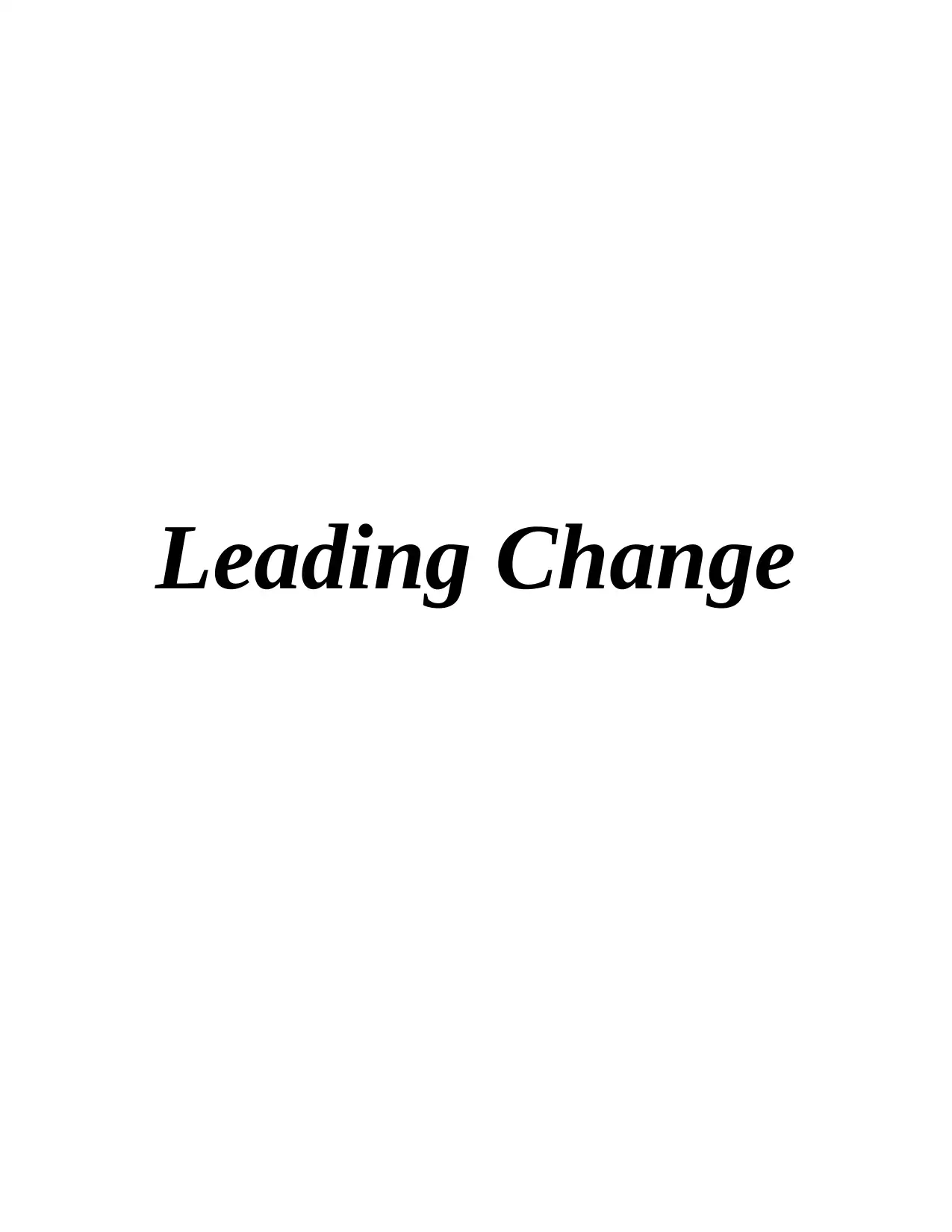
Leading Change
Secure Best Marks with AI Grader
Need help grading? Try our AI Grader for instant feedback on your assignments.
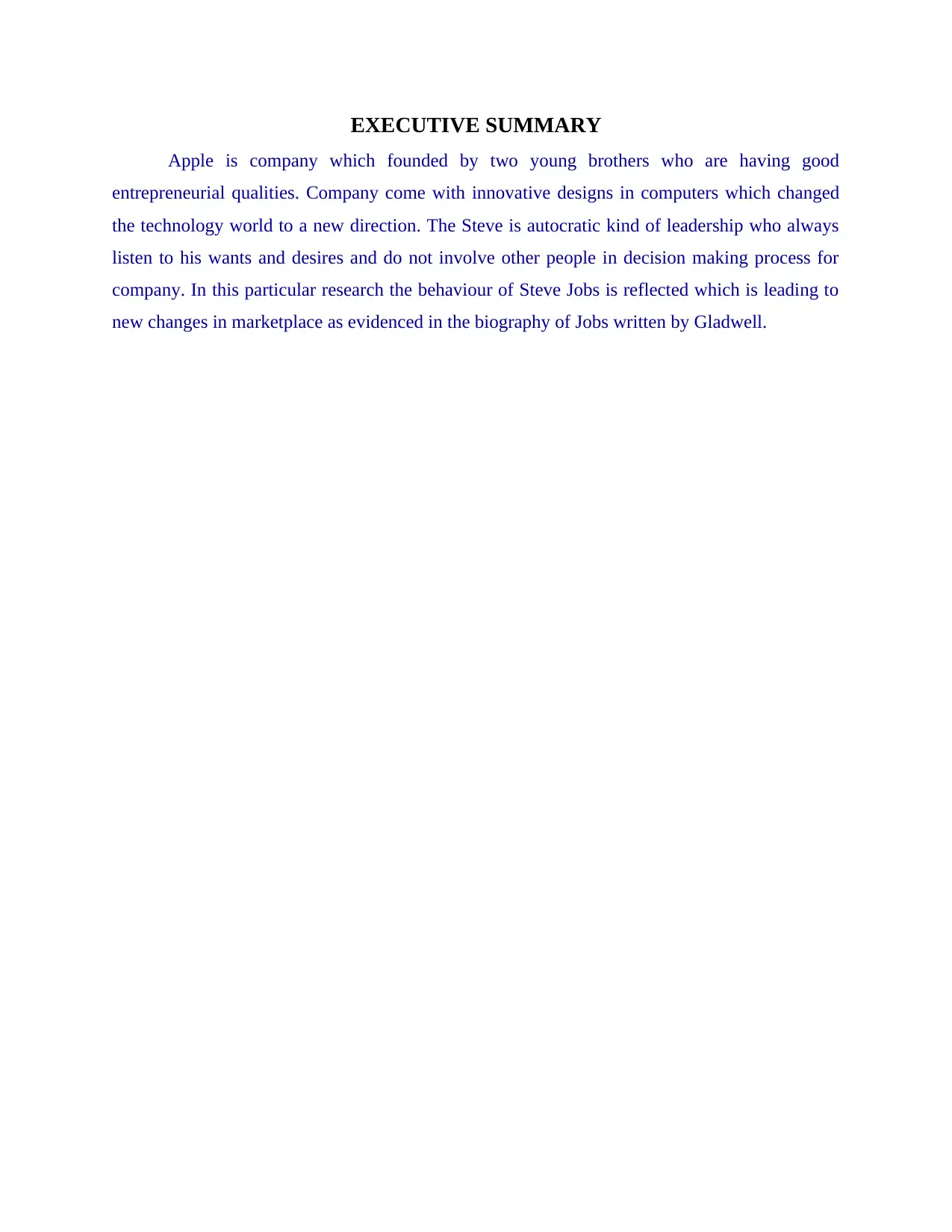
EXECUTIVE SUMMARY
Apple is company which founded by two young brothers who are having good
entrepreneurial qualities. Company come with innovative designs in computers which changed
the technology world to a new direction. The Steve is autocratic kind of leadership who always
listen to his wants and desires and do not involve other people in decision making process for
company. In this particular research the behaviour of Steve Jobs is reflected which is leading to
new changes in marketplace as evidenced in the biography of Jobs written by Gladwell.
Apple is company which founded by two young brothers who are having good
entrepreneurial qualities. Company come with innovative designs in computers which changed
the technology world to a new direction. The Steve is autocratic kind of leadership who always
listen to his wants and desires and do not involve other people in decision making process for
company. In this particular research the behaviour of Steve Jobs is reflected which is leading to
new changes in marketplace as evidenced in the biography of Jobs written by Gladwell.

TABLE OF CONTENTS
INTRODUCTION...........................................................................................................................1
DISCUSSION..................................................................................................................................1
CONCLUSION................................................................................................................................7
REFERENCES................................................................................................................................8
INTRODUCTION...........................................................................................................................1
DISCUSSION..................................................................................................................................1
CONCLUSION................................................................................................................................7
REFERENCES................................................................................................................................8
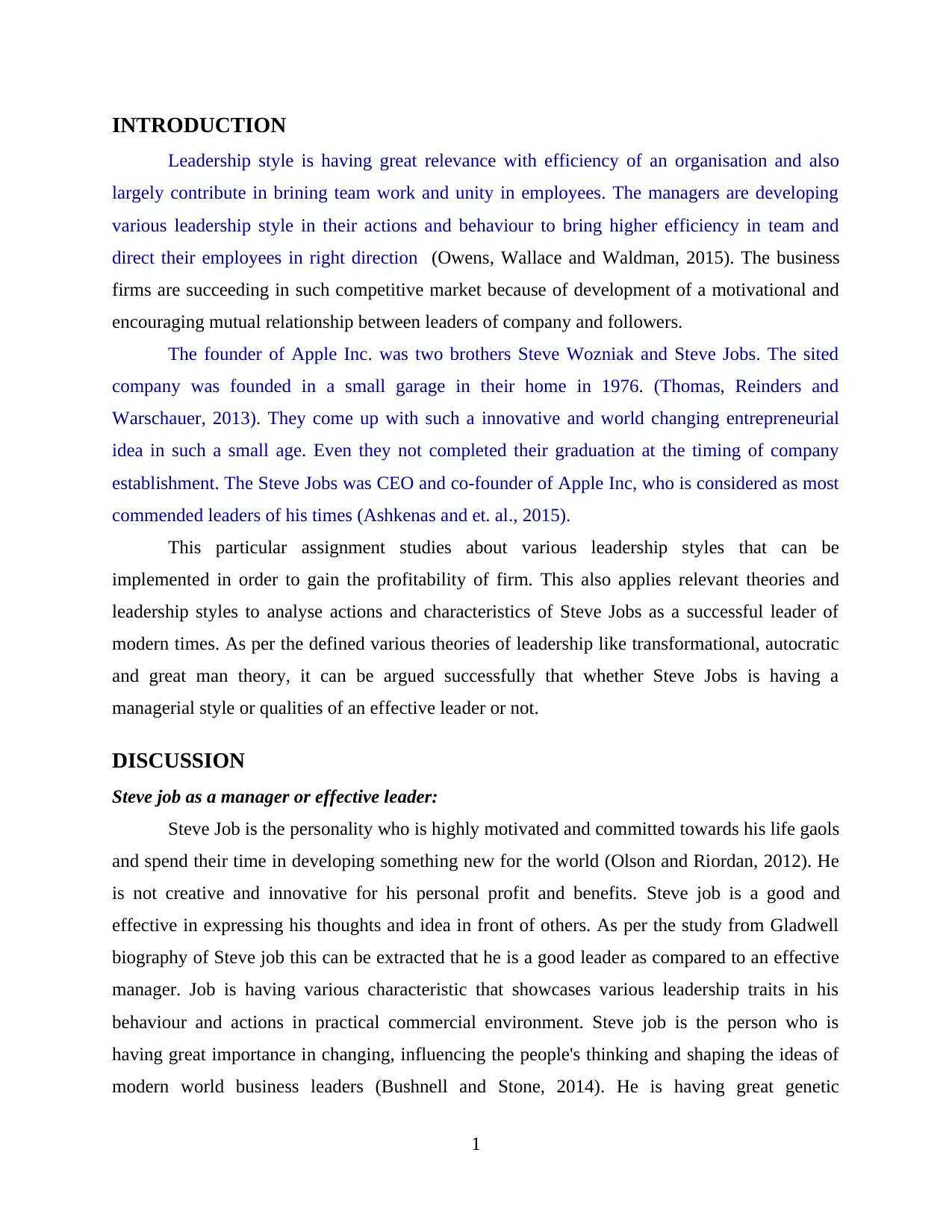
INTRODUCTION
Leadership style is having great relevance with efficiency of an organisation and also
largely contribute in brining team work and unity in employees. The managers are developing
various leadership style in their actions and behaviour to bring higher efficiency in team and
direct their employees in right direction (Owens, Wallace and Waldman, 2015). The business
firms are succeeding in such competitive market because of development of a motivational and
encouraging mutual relationship between leaders of company and followers.
The founder of Apple Inc. was two brothers Steve Wozniak and Steve Jobs. The sited
company was founded in a small garage in their home in 1976. (Thomas, Reinders and
Warschauer, 2013). They come up with such a innovative and world changing entrepreneurial
idea in such a small age. Even they not completed their graduation at the timing of company
establishment. The Steve Jobs was CEO and co-founder of Apple Inc, who is considered as most
commended leaders of his times (Ashkenas and et. al., 2015).
This particular assignment studies about various leadership styles that can be
implemented in order to gain the profitability of firm. This also applies relevant theories and
leadership styles to analyse actions and characteristics of Steve Jobs as a successful leader of
modern times. As per the defined various theories of leadership like transformational, autocratic
and great man theory, it can be argued successfully that whether Steve Jobs is having a
managerial style or qualities of an effective leader or not.
DISCUSSION
Steve job as a manager or effective leader:
Steve Job is the personality who is highly motivated and committed towards his life gaols
and spend their time in developing something new for the world (Olson and Riordan, 2012). He
is not creative and innovative for his personal profit and benefits. Steve job is a good and
effective in expressing his thoughts and idea in front of others. As per the study from Gladwell
biography of Steve job this can be extracted that he is a good leader as compared to an effective
manager. Job is having various characteristic that showcases various leadership traits in his
behaviour and actions in practical commercial environment. Steve job is the person who is
having great importance in changing, influencing the people's thinking and shaping the ideas of
modern world business leaders (Bushnell and Stone, 2014). He is having great genetic
1
Leadership style is having great relevance with efficiency of an organisation and also
largely contribute in brining team work and unity in employees. The managers are developing
various leadership style in their actions and behaviour to bring higher efficiency in team and
direct their employees in right direction (Owens, Wallace and Waldman, 2015). The business
firms are succeeding in such competitive market because of development of a motivational and
encouraging mutual relationship between leaders of company and followers.
The founder of Apple Inc. was two brothers Steve Wozniak and Steve Jobs. The sited
company was founded in a small garage in their home in 1976. (Thomas, Reinders and
Warschauer, 2013). They come up with such a innovative and world changing entrepreneurial
idea in such a small age. Even they not completed their graduation at the timing of company
establishment. The Steve Jobs was CEO and co-founder of Apple Inc, who is considered as most
commended leaders of his times (Ashkenas and et. al., 2015).
This particular assignment studies about various leadership styles that can be
implemented in order to gain the profitability of firm. This also applies relevant theories and
leadership styles to analyse actions and characteristics of Steve Jobs as a successful leader of
modern times. As per the defined various theories of leadership like transformational, autocratic
and great man theory, it can be argued successfully that whether Steve Jobs is having a
managerial style or qualities of an effective leader or not.
DISCUSSION
Steve job as a manager or effective leader:
Steve Job is the personality who is highly motivated and committed towards his life gaols
and spend their time in developing something new for the world (Olson and Riordan, 2012). He
is not creative and innovative for his personal profit and benefits. Steve job is a good and
effective in expressing his thoughts and idea in front of others. As per the study from Gladwell
biography of Steve job this can be extracted that he is a good leader as compared to an effective
manager. Job is having various characteristic that showcases various leadership traits in his
behaviour and actions in practical commercial environment. Steve job is the person who is
having great importance in changing, influencing the people's thinking and shaping the ideas of
modern world business leaders (Bushnell and Stone, 2014). He is having great genetic
1
Secure Best Marks with AI Grader
Need help grading? Try our AI Grader for instant feedback on your assignments.
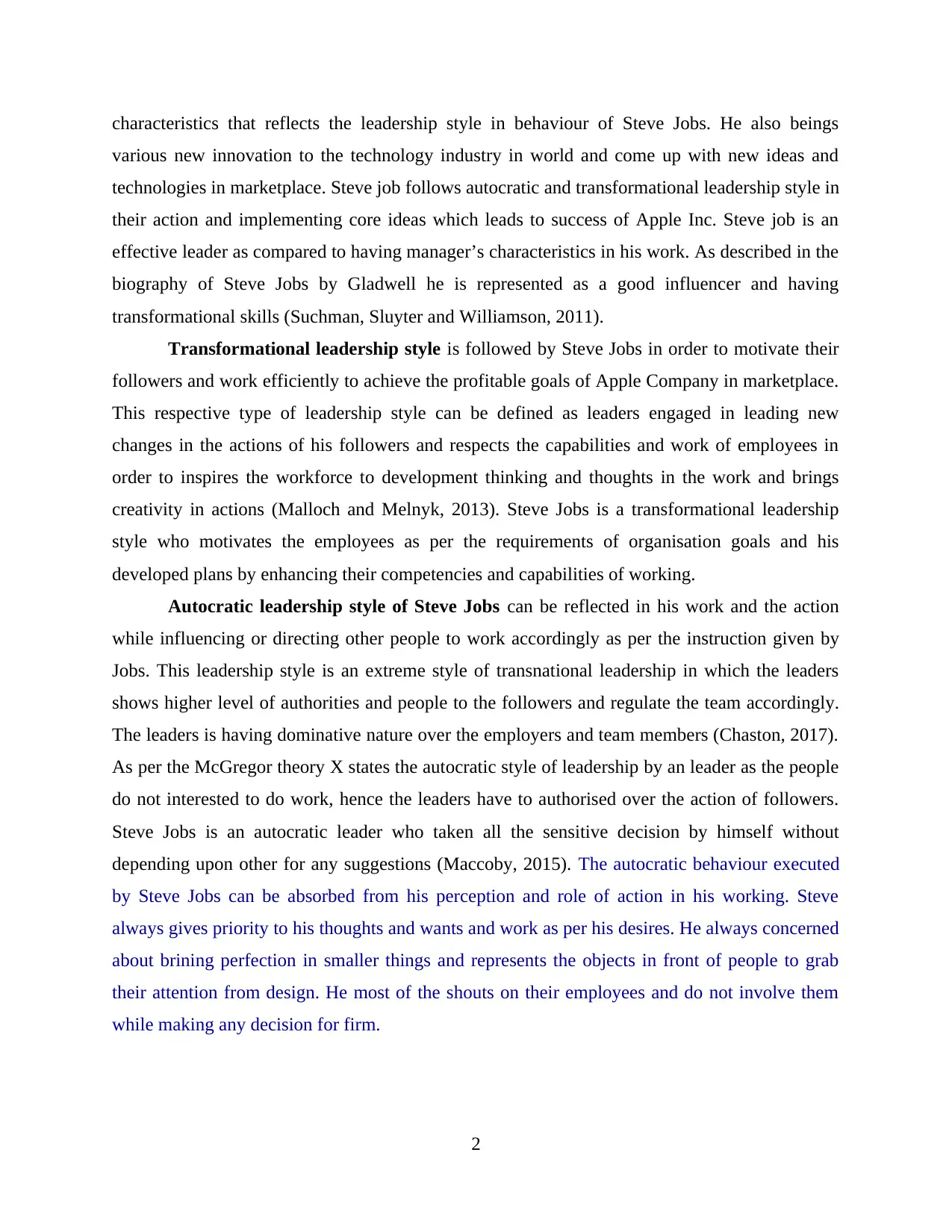
characteristics that reflects the leadership style in behaviour of Steve Jobs. He also beings
various new innovation to the technology industry in world and come up with new ideas and
technologies in marketplace. Steve job follows autocratic and transformational leadership style in
their action and implementing core ideas which leads to success of Apple Inc. Steve job is an
effective leader as compared to having manager’s characteristics in his work. As described in the
biography of Steve Jobs by Gladwell he is represented as a good influencer and having
transformational skills (Suchman, Sluyter and Williamson, 2011).
Transformational leadership style is followed by Steve Jobs in order to motivate their
followers and work efficiently to achieve the profitable goals of Apple Company in marketplace.
This respective type of leadership style can be defined as leaders engaged in leading new
changes in the actions of his followers and respects the capabilities and work of employees in
order to inspires the workforce to development thinking and thoughts in the work and brings
creativity in actions (Malloch and Melnyk, 2013). Steve Jobs is a transformational leadership
style who motivates the employees as per the requirements of organisation goals and his
developed plans by enhancing their competencies and capabilities of working.
Autocratic leadership style of Steve Jobs can be reflected in his work and the action
while influencing or directing other people to work accordingly as per the instruction given by
Jobs. This leadership style is an extreme style of transnational leadership in which the leaders
shows higher level of authorities and people to the followers and regulate the team accordingly.
The leaders is having dominative nature over the employers and team members (Chaston, 2017).
As per the McGregor theory X states the autocratic style of leadership by an leader as the people
do not interested to do work, hence the leaders have to authorised over the action of followers.
Steve Jobs is an autocratic leader who taken all the sensitive decision by himself without
depending upon other for any suggestions (Maccoby, 2015). The autocratic behaviour executed
by Steve Jobs can be absorbed from his perception and role of action in his working. Steve
always gives priority to his thoughts and wants and work as per his desires. He always concerned
about brining perfection in smaller things and represents the objects in front of people to grab
their attention from design. He most of the shouts on their employees and do not involve them
while making any decision for firm.
2
various new innovation to the technology industry in world and come up with new ideas and
technologies in marketplace. Steve job follows autocratic and transformational leadership style in
their action and implementing core ideas which leads to success of Apple Inc. Steve job is an
effective leader as compared to having manager’s characteristics in his work. As described in the
biography of Steve Jobs by Gladwell he is represented as a good influencer and having
transformational skills (Suchman, Sluyter and Williamson, 2011).
Transformational leadership style is followed by Steve Jobs in order to motivate their
followers and work efficiently to achieve the profitable goals of Apple Company in marketplace.
This respective type of leadership style can be defined as leaders engaged in leading new
changes in the actions of his followers and respects the capabilities and work of employees in
order to inspires the workforce to development thinking and thoughts in the work and brings
creativity in actions (Malloch and Melnyk, 2013). Steve Jobs is a transformational leadership
style who motivates the employees as per the requirements of organisation goals and his
developed plans by enhancing their competencies and capabilities of working.
Autocratic leadership style of Steve Jobs can be reflected in his work and the action
while influencing or directing other people to work accordingly as per the instruction given by
Jobs. This leadership style is an extreme style of transnational leadership in which the leaders
shows higher level of authorities and people to the followers and regulate the team accordingly.
The leaders is having dominative nature over the employers and team members (Chaston, 2017).
As per the McGregor theory X states the autocratic style of leadership by an leader as the people
do not interested to do work, hence the leaders have to authorised over the action of followers.
Steve Jobs is an autocratic leader who taken all the sensitive decision by himself without
depending upon other for any suggestions (Maccoby, 2015). The autocratic behaviour executed
by Steve Jobs can be absorbed from his perception and role of action in his working. Steve
always gives priority to his thoughts and wants and work as per his desires. He always concerned
about brining perfection in smaller things and represents the objects in front of people to grab
their attention from design. He most of the shouts on their employees and do not involve them
while making any decision for firm.
2
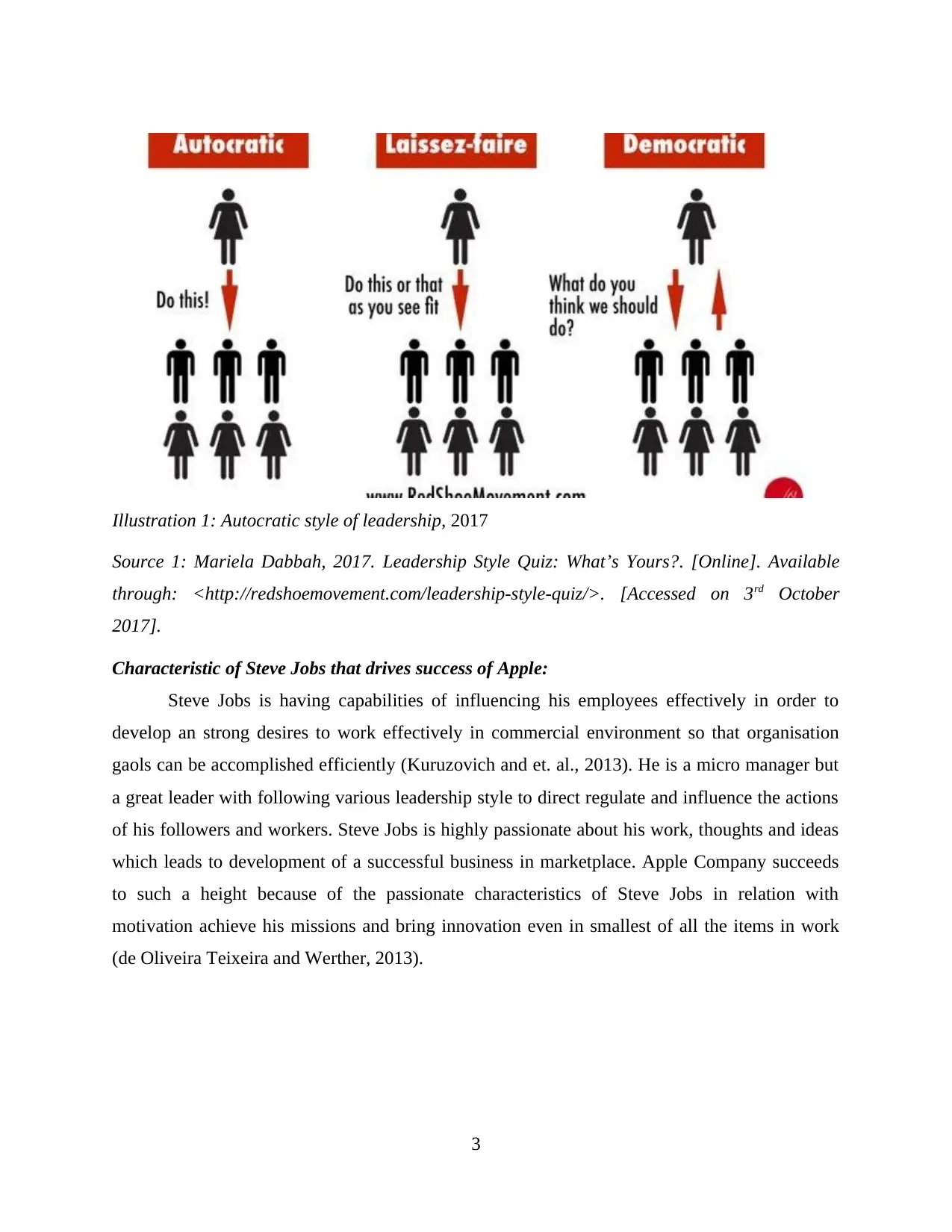
Characteristic of Steve Jobs that drives success of Apple:
Steve Jobs is having capabilities of influencing his employees effectively in order to
develop an strong desires to work effectively in commercial environment so that organisation
gaols can be accomplished efficiently (Kuruzovich and et. al., 2013). He is a micro manager but
a great leader with following various leadership style to direct regulate and influence the actions
of his followers and workers. Steve Jobs is highly passionate about his work, thoughts and ideas
which leads to development of a successful business in marketplace. Apple Company succeeds
to such a height because of the passionate characteristics of Steve Jobs in relation with
motivation achieve his missions and bring innovation even in smallest of all the items in work
(de Oliveira Teixeira and Werther, 2013).
3
Illustration 1: Autocratic style of leadership, 2017
Source 1: Mariela Dabbah, 2017. Leadership Style Quiz: What’s Yours?. [Online]. Available
through: <http://redshoemovement.com/leadership-style-quiz/>. [Accessed on 3rd October
2017].
Steve Jobs is having capabilities of influencing his employees effectively in order to
develop an strong desires to work effectively in commercial environment so that organisation
gaols can be accomplished efficiently (Kuruzovich and et. al., 2013). He is a micro manager but
a great leader with following various leadership style to direct regulate and influence the actions
of his followers and workers. Steve Jobs is highly passionate about his work, thoughts and ideas
which leads to development of a successful business in marketplace. Apple Company succeeds
to such a height because of the passionate characteristics of Steve Jobs in relation with
motivation achieve his missions and bring innovation even in smallest of all the items in work
(de Oliveira Teixeira and Werther, 2013).
3
Illustration 1: Autocratic style of leadership, 2017
Source 1: Mariela Dabbah, 2017. Leadership Style Quiz: What’s Yours?. [Online]. Available
through: <http://redshoemovement.com/leadership-style-quiz/>. [Accessed on 3rd October
2017].
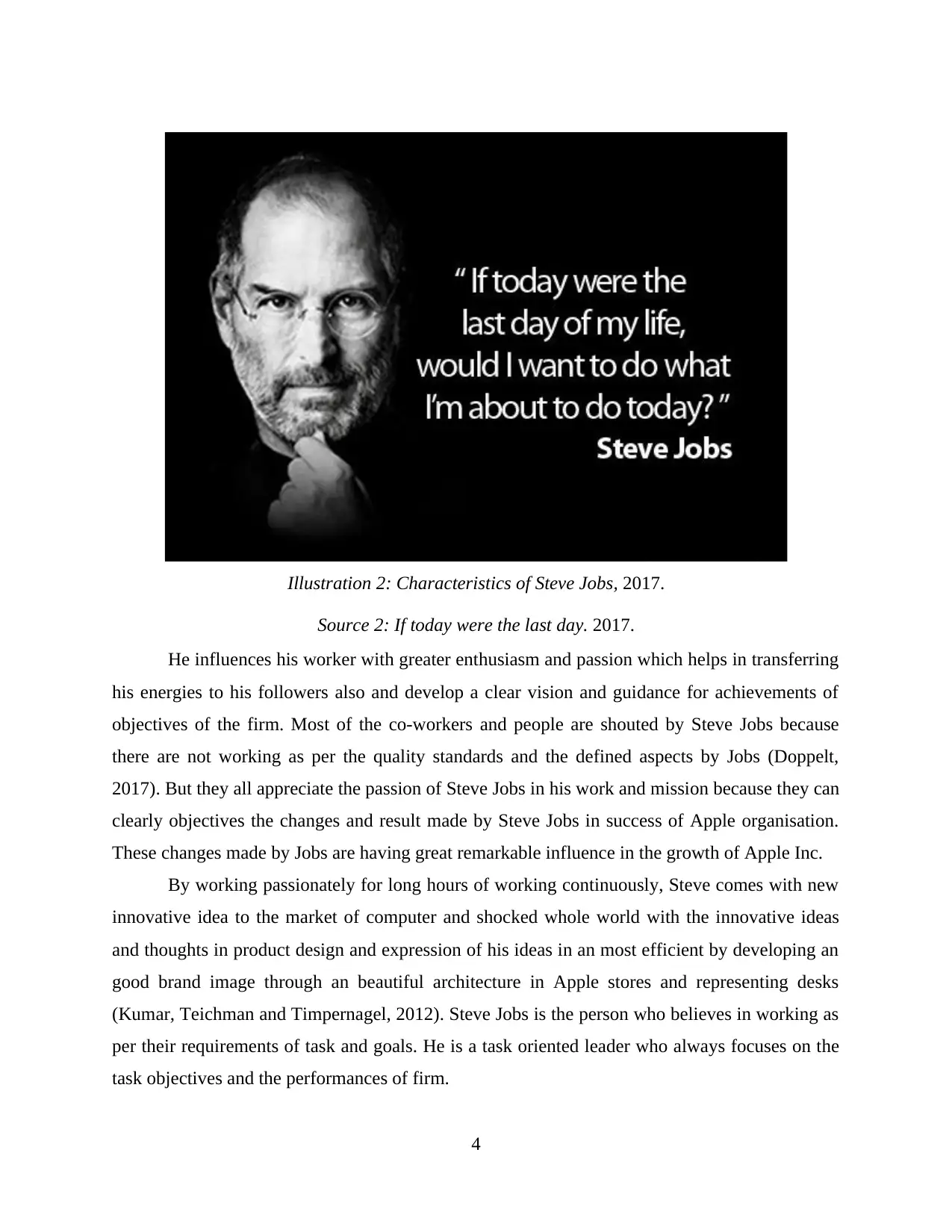
He influences his worker with greater enthusiasm and passion which helps in transferring
his energies to his followers also and develop a clear vision and guidance for achievements of
objectives of the firm. Most of the co-workers and people are shouted by Steve Jobs because
there are not working as per the quality standards and the defined aspects by Jobs (Doppelt,
2017). But they all appreciate the passion of Steve Jobs in his work and mission because they can
clearly objectives the changes and result made by Steve Jobs in success of Apple organisation.
These changes made by Jobs are having great remarkable influence in the growth of Apple Inc.
By working passionately for long hours of working continuously, Steve comes with new
innovative idea to the market of computer and shocked whole world with the innovative ideas
and thoughts in product design and expression of his ideas in an most efficient by developing an
good brand image through an beautiful architecture in Apple stores and representing desks
(Kumar, Teichman and Timpernagel, 2012). Steve Jobs is the person who believes in working as
per their requirements of task and goals. He is a task oriented leader who always focuses on the
task objectives and the performances of firm.
4
Illustration 2: Characteristics of Steve Jobs, 2017.
Source 2: If today were the last day. 2017.
his energies to his followers also and develop a clear vision and guidance for achievements of
objectives of the firm. Most of the co-workers and people are shouted by Steve Jobs because
there are not working as per the quality standards and the defined aspects by Jobs (Doppelt,
2017). But they all appreciate the passion of Steve Jobs in his work and mission because they can
clearly objectives the changes and result made by Steve Jobs in success of Apple organisation.
These changes made by Jobs are having great remarkable influence in the growth of Apple Inc.
By working passionately for long hours of working continuously, Steve comes with new
innovative idea to the market of computer and shocked whole world with the innovative ideas
and thoughts in product design and expression of his ideas in an most efficient by developing an
good brand image through an beautiful architecture in Apple stores and representing desks
(Kumar, Teichman and Timpernagel, 2012). Steve Jobs is the person who believes in working as
per their requirements of task and goals. He is a task oriented leader who always focuses on the
task objectives and the performances of firm.
4
Illustration 2: Characteristics of Steve Jobs, 2017.
Source 2: If today were the last day. 2017.
Paraphrase This Document
Need a fresh take? Get an instant paraphrase of this document with our AI Paraphraser
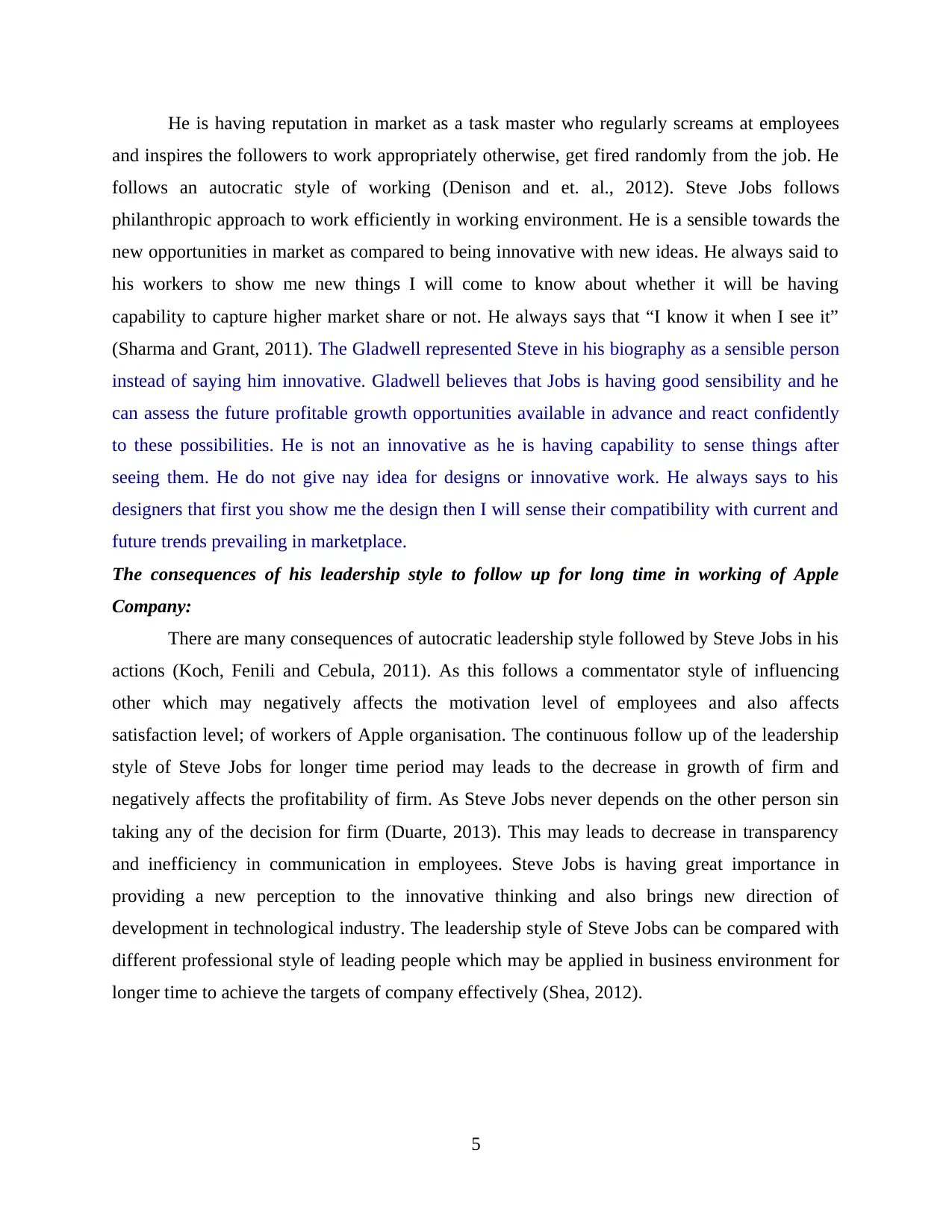
He is having reputation in market as a task master who regularly screams at employees
and inspires the followers to work appropriately otherwise, get fired randomly from the job. He
follows an autocratic style of working (Denison and et. al., 2012). Steve Jobs follows
philanthropic approach to work efficiently in working environment. He is a sensible towards the
new opportunities in market as compared to being innovative with new ideas. He always said to
his workers to show me new things I will come to know about whether it will be having
capability to capture higher market share or not. He always says that “I know it when I see it”
(Sharma and Grant, 2011). The Gladwell represented Steve in his biography as a sensible person
instead of saying him innovative. Gladwell believes that Jobs is having good sensibility and he
can assess the future profitable growth opportunities available in advance and react confidently
to these possibilities. He is not an innovative as he is having capability to sense things after
seeing them. He do not give nay idea for designs or innovative work. He always says to his
designers that first you show me the design then I will sense their compatibility with current and
future trends prevailing in marketplace.
The consequences of his leadership style to follow up for long time in working of Apple
Company:
There are many consequences of autocratic leadership style followed by Steve Jobs in his
actions (Koch, Fenili and Cebula, 2011). As this follows a commentator style of influencing
other which may negatively affects the motivation level of employees and also affects
satisfaction level; of workers of Apple organisation. The continuous follow up of the leadership
style of Steve Jobs for longer time period may leads to the decrease in growth of firm and
negatively affects the profitability of firm. As Steve Jobs never depends on the other person sin
taking any of the decision for firm (Duarte, 2013). This may leads to decrease in transparency
and inefficiency in communication in employees. Steve Jobs is having great importance in
providing a new perception to the innovative thinking and also brings new direction of
development in technological industry. The leadership style of Steve Jobs can be compared with
different professional style of leading people which may be applied in business environment for
longer time to achieve the targets of company effectively (Shea, 2012).
5
and inspires the followers to work appropriately otherwise, get fired randomly from the job. He
follows an autocratic style of working (Denison and et. al., 2012). Steve Jobs follows
philanthropic approach to work efficiently in working environment. He is a sensible towards the
new opportunities in market as compared to being innovative with new ideas. He always said to
his workers to show me new things I will come to know about whether it will be having
capability to capture higher market share or not. He always says that “I know it when I see it”
(Sharma and Grant, 2011). The Gladwell represented Steve in his biography as a sensible person
instead of saying him innovative. Gladwell believes that Jobs is having good sensibility and he
can assess the future profitable growth opportunities available in advance and react confidently
to these possibilities. He is not an innovative as he is having capability to sense things after
seeing them. He do not give nay idea for designs or innovative work. He always says to his
designers that first you show me the design then I will sense their compatibility with current and
future trends prevailing in marketplace.
The consequences of his leadership style to follow up for long time in working of Apple
Company:
There are many consequences of autocratic leadership style followed by Steve Jobs in his
actions (Koch, Fenili and Cebula, 2011). As this follows a commentator style of influencing
other which may negatively affects the motivation level of employees and also affects
satisfaction level; of workers of Apple organisation. The continuous follow up of the leadership
style of Steve Jobs for longer time period may leads to the decrease in growth of firm and
negatively affects the profitability of firm. As Steve Jobs never depends on the other person sin
taking any of the decision for firm (Duarte, 2013). This may leads to decrease in transparency
and inefficiency in communication in employees. Steve Jobs is having great importance in
providing a new perception to the innovative thinking and also brings new direction of
development in technological industry. The leadership style of Steve Jobs can be compared with
different professional style of leading people which may be applied in business environment for
longer time to achieve the targets of company effectively (Shea, 2012).
5
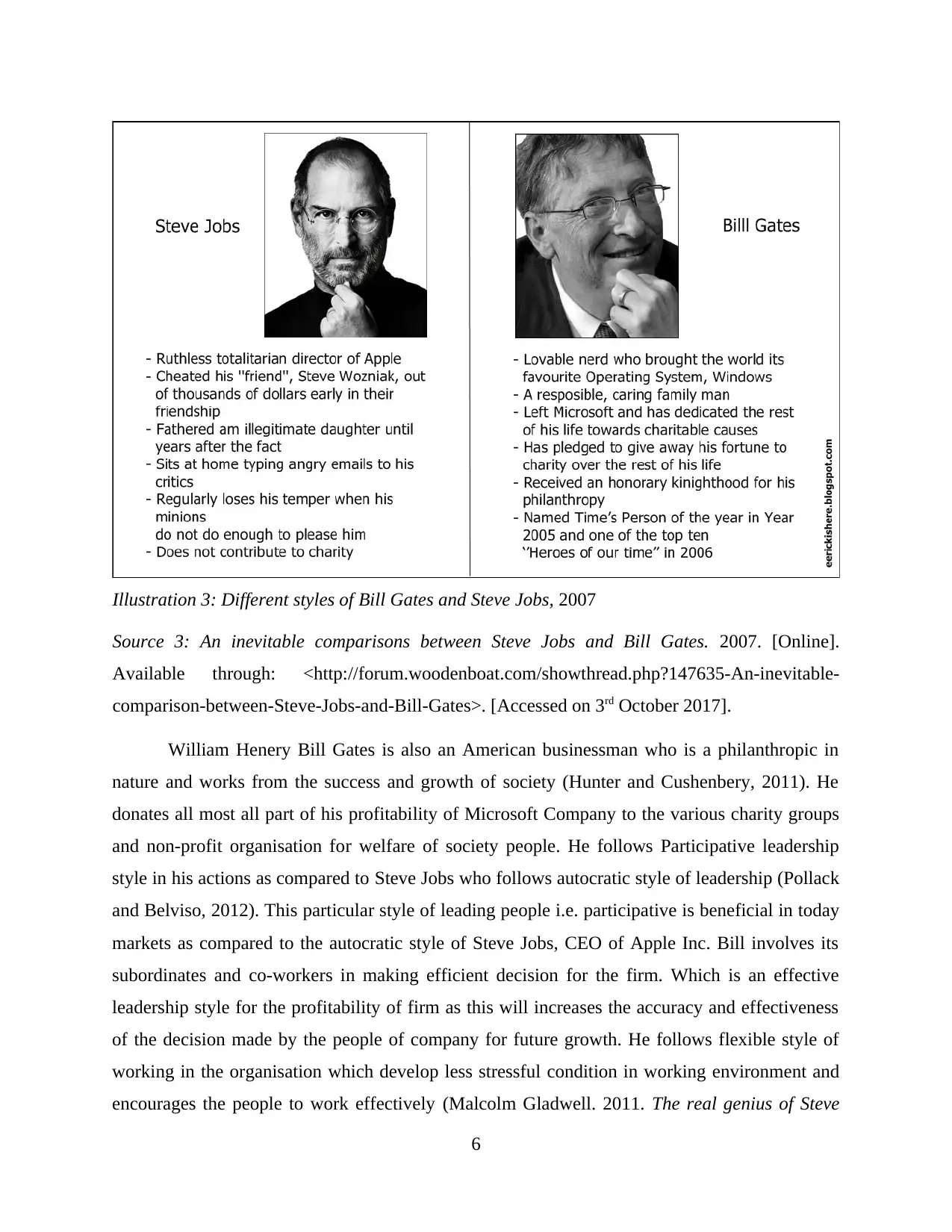
William Henery Bill Gates is also an American businessman who is a philanthropic in
nature and works from the success and growth of society (Hunter and Cushenbery, 2011). He
donates all most all part of his profitability of Microsoft Company to the various charity groups
and non-profit organisation for welfare of society people. He follows Participative leadership
style in his actions as compared to Steve Jobs who follows autocratic style of leadership (Pollack
and Belviso, 2012). This particular style of leading people i.e. participative is beneficial in today
markets as compared to the autocratic style of Steve Jobs, CEO of Apple Inc. Bill involves its
subordinates and co-workers in making efficient decision for the firm. Which is an effective
leadership style for the profitability of firm as this will increases the accuracy and effectiveness
of the decision made by the people of company for future growth. He follows flexible style of
working in the organisation which develop less stressful condition in working environment and
encourages the people to work effectively (Malcolm Gladwell. 2011. The real genius of Steve
6
Illustration 3: Different styles of Bill Gates and Steve Jobs, 2007
Source 3: An inevitable comparisons between Steve Jobs and Bill Gates. 2007. [Online].
Available through: <http://forum.woodenboat.com/showthread.php?147635-An-inevitable-
comparison-between-Steve-Jobs-and-Bill-Gates>. [Accessed on 3rd October 2017].
nature and works from the success and growth of society (Hunter and Cushenbery, 2011). He
donates all most all part of his profitability of Microsoft Company to the various charity groups
and non-profit organisation for welfare of society people. He follows Participative leadership
style in his actions as compared to Steve Jobs who follows autocratic style of leadership (Pollack
and Belviso, 2012). This particular style of leading people i.e. participative is beneficial in today
markets as compared to the autocratic style of Steve Jobs, CEO of Apple Inc. Bill involves its
subordinates and co-workers in making efficient decision for the firm. Which is an effective
leadership style for the profitability of firm as this will increases the accuracy and effectiveness
of the decision made by the people of company for future growth. He follows flexible style of
working in the organisation which develop less stressful condition in working environment and
encourages the people to work effectively (Malcolm Gladwell. 2011. The real genius of Steve
6
Illustration 3: Different styles of Bill Gates and Steve Jobs, 2007
Source 3: An inevitable comparisons between Steve Jobs and Bill Gates. 2007. [Online].
Available through: <http://forum.woodenboat.com/showthread.php?147635-An-inevitable-
comparison-between-Steve-Jobs-and-Bill-Gates>. [Accessed on 3rd October 2017].
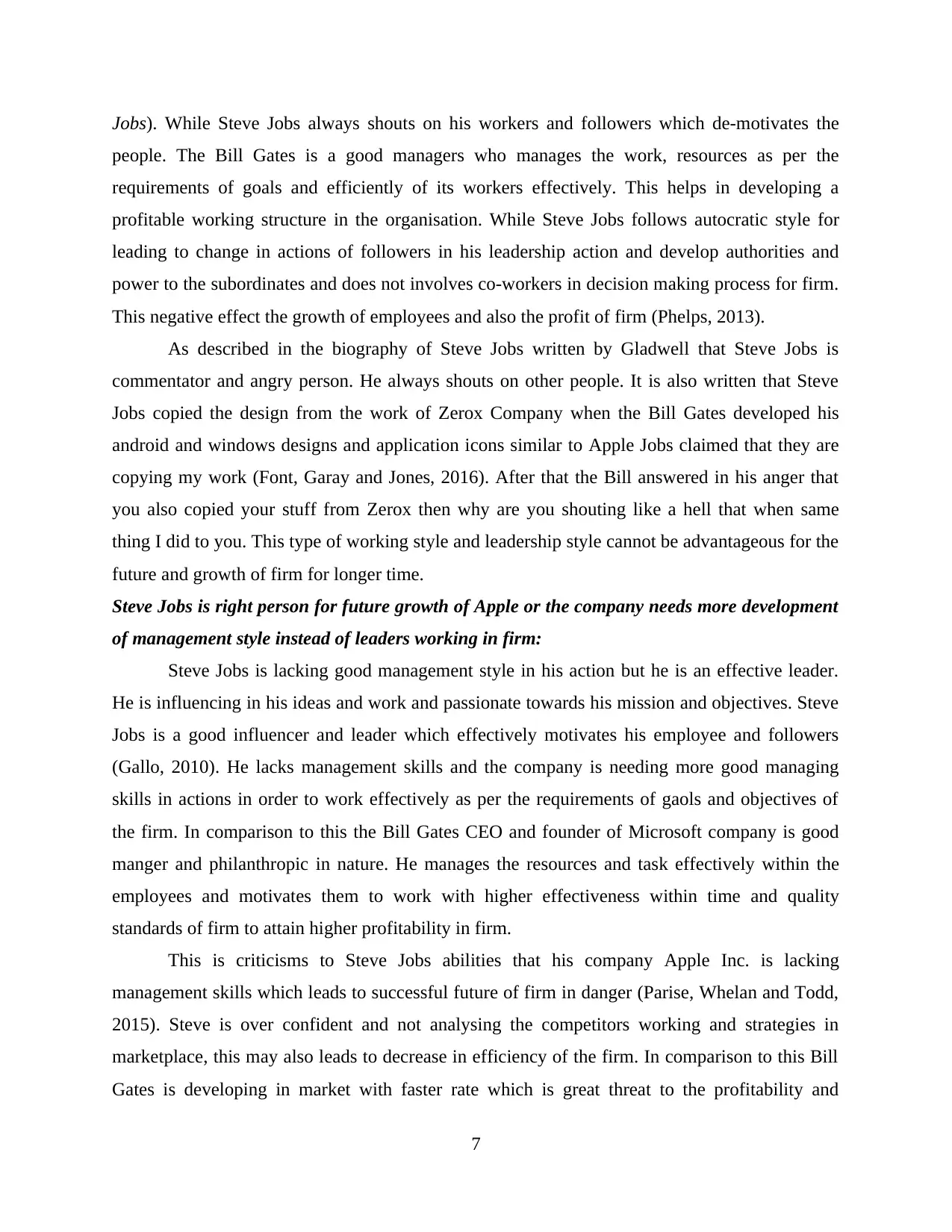
Jobs). While Steve Jobs always shouts on his workers and followers which de-motivates the
people. The Bill Gates is a good managers who manages the work, resources as per the
requirements of goals and efficiently of its workers effectively. This helps in developing a
profitable working structure in the organisation. While Steve Jobs follows autocratic style for
leading to change in actions of followers in his leadership action and develop authorities and
power to the subordinates and does not involves co-workers in decision making process for firm.
This negative effect the growth of employees and also the profit of firm (Phelps, 2013).
As described in the biography of Steve Jobs written by Gladwell that Steve Jobs is
commentator and angry person. He always shouts on other people. It is also written that Steve
Jobs copied the design from the work of Zerox Company when the Bill Gates developed his
android and windows designs and application icons similar to Apple Jobs claimed that they are
copying my work (Font, Garay and Jones, 2016). After that the Bill answered in his anger that
you also copied your stuff from Zerox then why are you shouting like a hell that when same
thing I did to you. This type of working style and leadership style cannot be advantageous for the
future and growth of firm for longer time.
Steve Jobs is right person for future growth of Apple or the company needs more development
of management style instead of leaders working in firm:
Steve Jobs is lacking good management style in his action but he is an effective leader.
He is influencing in his ideas and work and passionate towards his mission and objectives. Steve
Jobs is a good influencer and leader which effectively motivates his employee and followers
(Gallo, 2010). He lacks management skills and the company is needing more good managing
skills in actions in order to work effectively as per the requirements of gaols and objectives of
the firm. In comparison to this the Bill Gates CEO and founder of Microsoft company is good
manger and philanthropic in nature. He manages the resources and task effectively within the
employees and motivates them to work with higher effectiveness within time and quality
standards of firm to attain higher profitability in firm.
This is criticisms to Steve Jobs abilities that his company Apple Inc. is lacking
management skills which leads to successful future of firm in danger (Parise, Whelan and Todd,
2015). Steve is over confident and not analysing the competitors working and strategies in
marketplace, this may also leads to decrease in efficiency of the firm. In comparison to this Bill
Gates is developing in market with faster rate which is great threat to the profitability and
7
people. The Bill Gates is a good managers who manages the work, resources as per the
requirements of goals and efficiently of its workers effectively. This helps in developing a
profitable working structure in the organisation. While Steve Jobs follows autocratic style for
leading to change in actions of followers in his leadership action and develop authorities and
power to the subordinates and does not involves co-workers in decision making process for firm.
This negative effect the growth of employees and also the profit of firm (Phelps, 2013).
As described in the biography of Steve Jobs written by Gladwell that Steve Jobs is
commentator and angry person. He always shouts on other people. It is also written that Steve
Jobs copied the design from the work of Zerox Company when the Bill Gates developed his
android and windows designs and application icons similar to Apple Jobs claimed that they are
copying my work (Font, Garay and Jones, 2016). After that the Bill answered in his anger that
you also copied your stuff from Zerox then why are you shouting like a hell that when same
thing I did to you. This type of working style and leadership style cannot be advantageous for the
future and growth of firm for longer time.
Steve Jobs is right person for future growth of Apple or the company needs more development
of management style instead of leaders working in firm:
Steve Jobs is lacking good management style in his action but he is an effective leader.
He is influencing in his ideas and work and passionate towards his mission and objectives. Steve
Jobs is a good influencer and leader which effectively motivates his employee and followers
(Gallo, 2010). He lacks management skills and the company is needing more good managing
skills in actions in order to work effectively as per the requirements of gaols and objectives of
the firm. In comparison to this the Bill Gates CEO and founder of Microsoft company is good
manger and philanthropic in nature. He manages the resources and task effectively within the
employees and motivates them to work with higher effectiveness within time and quality
standards of firm to attain higher profitability in firm.
This is criticisms to Steve Jobs abilities that his company Apple Inc. is lacking
management skills which leads to successful future of firm in danger (Parise, Whelan and Todd,
2015). Steve is over confident and not analysing the competitors working and strategies in
marketplace, this may also leads to decrease in efficiency of the firm. In comparison to this Bill
Gates is developing in market with faster rate which is great threat to the profitability and
7
Secure Best Marks with AI Grader
Need help grading? Try our AI Grader for instant feedback on your assignments.
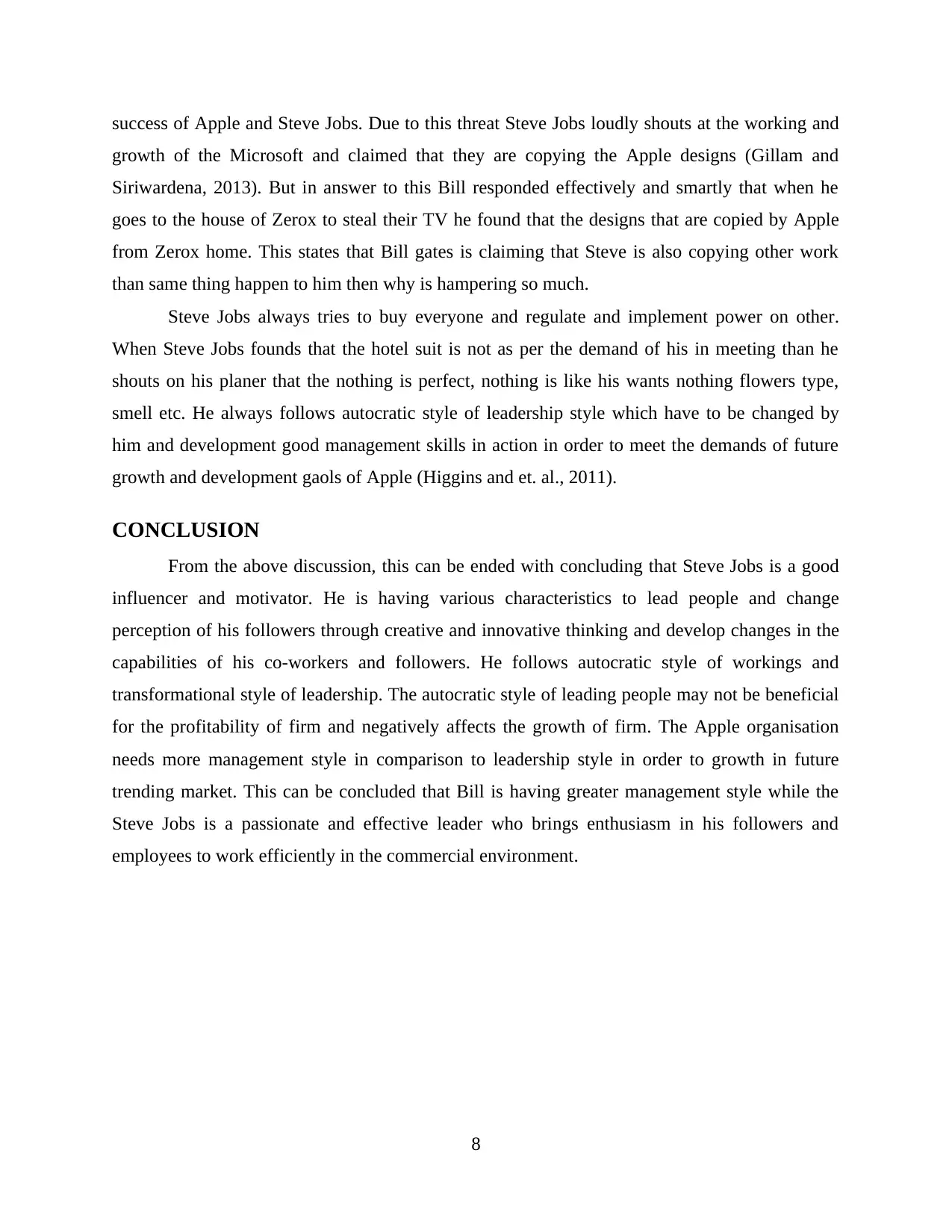
success of Apple and Steve Jobs. Due to this threat Steve Jobs loudly shouts at the working and
growth of the Microsoft and claimed that they are copying the Apple designs (Gillam and
Siriwardena, 2013). But in answer to this Bill responded effectively and smartly that when he
goes to the house of Zerox to steal their TV he found that the designs that are copied by Apple
from Zerox home. This states that Bill gates is claiming that Steve is also copying other work
than same thing happen to him then why is hampering so much.
Steve Jobs always tries to buy everyone and regulate and implement power on other.
When Steve Jobs founds that the hotel suit is not as per the demand of his in meeting than he
shouts on his planer that the nothing is perfect, nothing is like his wants nothing flowers type,
smell etc. He always follows autocratic style of leadership style which have to be changed by
him and development good management skills in action in order to meet the demands of future
growth and development gaols of Apple (Higgins and et. al., 2011).
CONCLUSION
From the above discussion, this can be ended with concluding that Steve Jobs is a good
influencer and motivator. He is having various characteristics to lead people and change
perception of his followers through creative and innovative thinking and develop changes in the
capabilities of his co-workers and followers. He follows autocratic style of workings and
transformational style of leadership. The autocratic style of leading people may not be beneficial
for the profitability of firm and negatively affects the growth of firm. The Apple organisation
needs more management style in comparison to leadership style in order to growth in future
trending market. This can be concluded that Bill is having greater management style while the
Steve Jobs is a passionate and effective leader who brings enthusiasm in his followers and
employees to work efficiently in the commercial environment.
8
growth of the Microsoft and claimed that they are copying the Apple designs (Gillam and
Siriwardena, 2013). But in answer to this Bill responded effectively and smartly that when he
goes to the house of Zerox to steal their TV he found that the designs that are copied by Apple
from Zerox home. This states that Bill gates is claiming that Steve is also copying other work
than same thing happen to him then why is hampering so much.
Steve Jobs always tries to buy everyone and regulate and implement power on other.
When Steve Jobs founds that the hotel suit is not as per the demand of his in meeting than he
shouts on his planer that the nothing is perfect, nothing is like his wants nothing flowers type,
smell etc. He always follows autocratic style of leadership style which have to be changed by
him and development good management skills in action in order to meet the demands of future
growth and development gaols of Apple (Higgins and et. al., 2011).
CONCLUSION
From the above discussion, this can be ended with concluding that Steve Jobs is a good
influencer and motivator. He is having various characteristics to lead people and change
perception of his followers through creative and innovative thinking and develop changes in the
capabilities of his co-workers and followers. He follows autocratic style of workings and
transformational style of leadership. The autocratic style of leading people may not be beneficial
for the profitability of firm and negatively affects the growth of firm. The Apple organisation
needs more management style in comparison to leadership style in order to growth in future
trending market. This can be concluded that Bill is having greater management style while the
Steve Jobs is a passionate and effective leader who brings enthusiasm in his followers and
employees to work efficiently in the commercial environment.
8
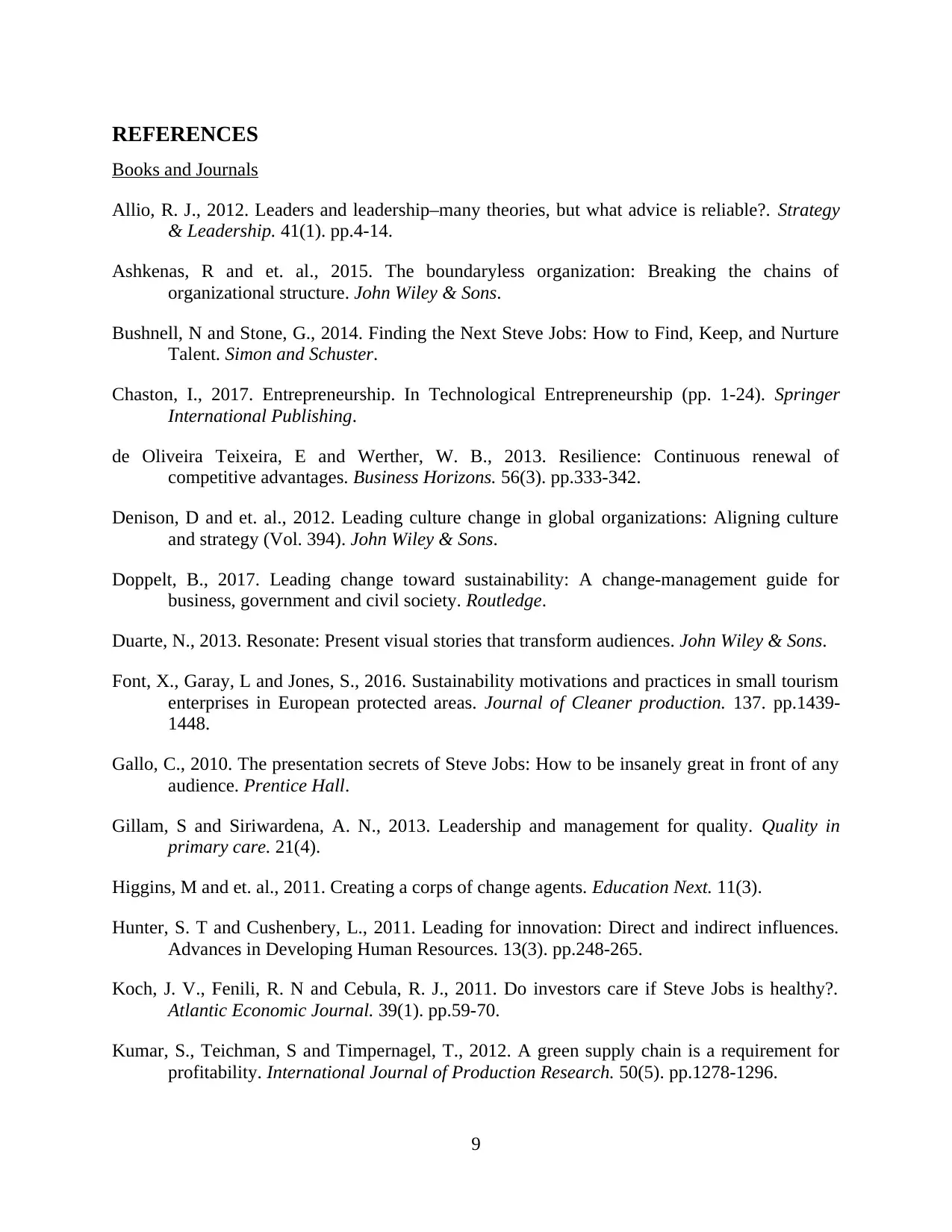
REFERENCES
Books and Journals
Allio, R. J., 2012. Leaders and leadership–many theories, but what advice is reliable?. Strategy
& Leadership. 41(1). pp.4-14.
Ashkenas, R and et. al., 2015. The boundaryless organization: Breaking the chains of
organizational structure. John Wiley & Sons.
Bushnell, N and Stone, G., 2014. Finding the Next Steve Jobs: How to Find, Keep, and Nurture
Talent. Simon and Schuster.
Chaston, I., 2017. Entrepreneurship. In Technological Entrepreneurship (pp. 1-24). Springer
International Publishing.
de Oliveira Teixeira, E and Werther, W. B., 2013. Resilience: Continuous renewal of
competitive advantages. Business Horizons. 56(3). pp.333-342.
Denison, D and et. al., 2012. Leading culture change in global organizations: Aligning culture
and strategy (Vol. 394). John Wiley & Sons.
Doppelt, B., 2017. Leading change toward sustainability: A change-management guide for
business, government and civil society. Routledge.
Duarte, N., 2013. Resonate: Present visual stories that transform audiences. John Wiley & Sons.
Font, X., Garay, L and Jones, S., 2016. Sustainability motivations and practices in small tourism
enterprises in European protected areas. Journal of Cleaner production. 137. pp.1439-
1448.
Gallo, C., 2010. The presentation secrets of Steve Jobs: How to be insanely great in front of any
audience. Prentice Hall.
Gillam, S and Siriwardena, A. N., 2013. Leadership and management for quality. Quality in
primary care. 21(4).
Higgins, M and et. al., 2011. Creating a corps of change agents. Education Next. 11(3).
Hunter, S. T and Cushenbery, L., 2011. Leading for innovation: Direct and indirect influences.
Advances in Developing Human Resources. 13(3). pp.248-265.
Koch, J. V., Fenili, R. N and Cebula, R. J., 2011. Do investors care if Steve Jobs is healthy?.
Atlantic Economic Journal. 39(1). pp.59-70.
Kumar, S., Teichman, S and Timpernagel, T., 2012. A green supply chain is a requirement for
profitability. International Journal of Production Research. 50(5). pp.1278-1296.
9
Books and Journals
Allio, R. J., 2012. Leaders and leadership–many theories, but what advice is reliable?. Strategy
& Leadership. 41(1). pp.4-14.
Ashkenas, R and et. al., 2015. The boundaryless organization: Breaking the chains of
organizational structure. John Wiley & Sons.
Bushnell, N and Stone, G., 2014. Finding the Next Steve Jobs: How to Find, Keep, and Nurture
Talent. Simon and Schuster.
Chaston, I., 2017. Entrepreneurship. In Technological Entrepreneurship (pp. 1-24). Springer
International Publishing.
de Oliveira Teixeira, E and Werther, W. B., 2013. Resilience: Continuous renewal of
competitive advantages. Business Horizons. 56(3). pp.333-342.
Denison, D and et. al., 2012. Leading culture change in global organizations: Aligning culture
and strategy (Vol. 394). John Wiley & Sons.
Doppelt, B., 2017. Leading change toward sustainability: A change-management guide for
business, government and civil society. Routledge.
Duarte, N., 2013. Resonate: Present visual stories that transform audiences. John Wiley & Sons.
Font, X., Garay, L and Jones, S., 2016. Sustainability motivations and practices in small tourism
enterprises in European protected areas. Journal of Cleaner production. 137. pp.1439-
1448.
Gallo, C., 2010. The presentation secrets of Steve Jobs: How to be insanely great in front of any
audience. Prentice Hall.
Gillam, S and Siriwardena, A. N., 2013. Leadership and management for quality. Quality in
primary care. 21(4).
Higgins, M and et. al., 2011. Creating a corps of change agents. Education Next. 11(3).
Hunter, S. T and Cushenbery, L., 2011. Leading for innovation: Direct and indirect influences.
Advances in Developing Human Resources. 13(3). pp.248-265.
Koch, J. V., Fenili, R. N and Cebula, R. J., 2011. Do investors care if Steve Jobs is healthy?.
Atlantic Economic Journal. 39(1). pp.59-70.
Kumar, S., Teichman, S and Timpernagel, T., 2012. A green supply chain is a requirement for
profitability. International Journal of Production Research. 50(5). pp.1278-1296.
9
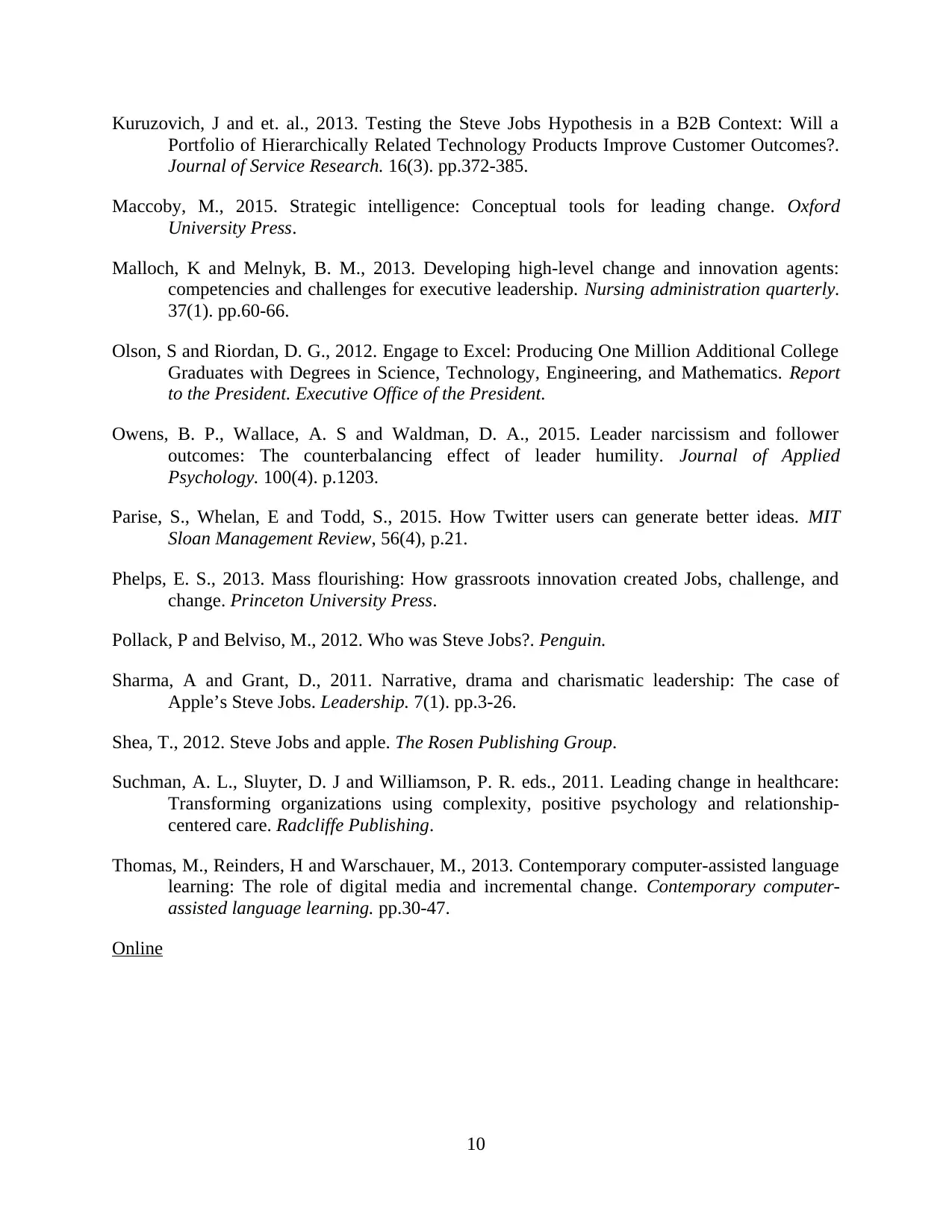
Kuruzovich, J and et. al., 2013. Testing the Steve Jobs Hypothesis in a B2B Context: Will a
Portfolio of Hierarchically Related Technology Products Improve Customer Outcomes?.
Journal of Service Research. 16(3). pp.372-385.
Maccoby, M., 2015. Strategic intelligence: Conceptual tools for leading change. Oxford
University Press.
Malloch, K and Melnyk, B. M., 2013. Developing high-level change and innovation agents:
competencies and challenges for executive leadership. Nursing administration quarterly.
37(1). pp.60-66.
Olson, S and Riordan, D. G., 2012. Engage to Excel: Producing One Million Additional College
Graduates with Degrees in Science, Technology, Engineering, and Mathematics. Report
to the President. Executive Office of the President.
Owens, B. P., Wallace, A. S and Waldman, D. A., 2015. Leader narcissism and follower
outcomes: The counterbalancing effect of leader humility. Journal of Applied
Psychology. 100(4). p.1203.
Parise, S., Whelan, E and Todd, S., 2015. How Twitter users can generate better ideas. MIT
Sloan Management Review, 56(4), p.21.
Phelps, E. S., 2013. Mass flourishing: How grassroots innovation created Jobs, challenge, and
change. Princeton University Press.
Pollack, P and Belviso, M., 2012. Who was Steve Jobs?. Penguin.
Sharma, A and Grant, D., 2011. Narrative, drama and charismatic leadership: The case of
Apple’s Steve Jobs. Leadership. 7(1). pp.3-26.
Shea, T., 2012. Steve Jobs and apple. The Rosen Publishing Group.
Suchman, A. L., Sluyter, D. J and Williamson, P. R. eds., 2011. Leading change in healthcare:
Transforming organizations using complexity, positive psychology and relationship-
centered care. Radcliffe Publishing.
Thomas, M., Reinders, H and Warschauer, M., 2013. Contemporary computer-assisted language
learning: The role of digital media and incremental change. Contemporary computer-
assisted language learning. pp.30-47.
Online
10
Portfolio of Hierarchically Related Technology Products Improve Customer Outcomes?.
Journal of Service Research. 16(3). pp.372-385.
Maccoby, M., 2015. Strategic intelligence: Conceptual tools for leading change. Oxford
University Press.
Malloch, K and Melnyk, B. M., 2013. Developing high-level change and innovation agents:
competencies and challenges for executive leadership. Nursing administration quarterly.
37(1). pp.60-66.
Olson, S and Riordan, D. G., 2012. Engage to Excel: Producing One Million Additional College
Graduates with Degrees in Science, Technology, Engineering, and Mathematics. Report
to the President. Executive Office of the President.
Owens, B. P., Wallace, A. S and Waldman, D. A., 2015. Leader narcissism and follower
outcomes: The counterbalancing effect of leader humility. Journal of Applied
Psychology. 100(4). p.1203.
Parise, S., Whelan, E and Todd, S., 2015. How Twitter users can generate better ideas. MIT
Sloan Management Review, 56(4), p.21.
Phelps, E. S., 2013. Mass flourishing: How grassroots innovation created Jobs, challenge, and
change. Princeton University Press.
Pollack, P and Belviso, M., 2012. Who was Steve Jobs?. Penguin.
Sharma, A and Grant, D., 2011. Narrative, drama and charismatic leadership: The case of
Apple’s Steve Jobs. Leadership. 7(1). pp.3-26.
Shea, T., 2012. Steve Jobs and apple. The Rosen Publishing Group.
Suchman, A. L., Sluyter, D. J and Williamson, P. R. eds., 2011. Leading change in healthcare:
Transforming organizations using complexity, positive psychology and relationship-
centered care. Radcliffe Publishing.
Thomas, M., Reinders, H and Warschauer, M., 2013. Contemporary computer-assisted language
learning: The role of digital media and incremental change. Contemporary computer-
assisted language learning. pp.30-47.
Online
10
Paraphrase This Document
Need a fresh take? Get an instant paraphrase of this document with our AI Paraphraser
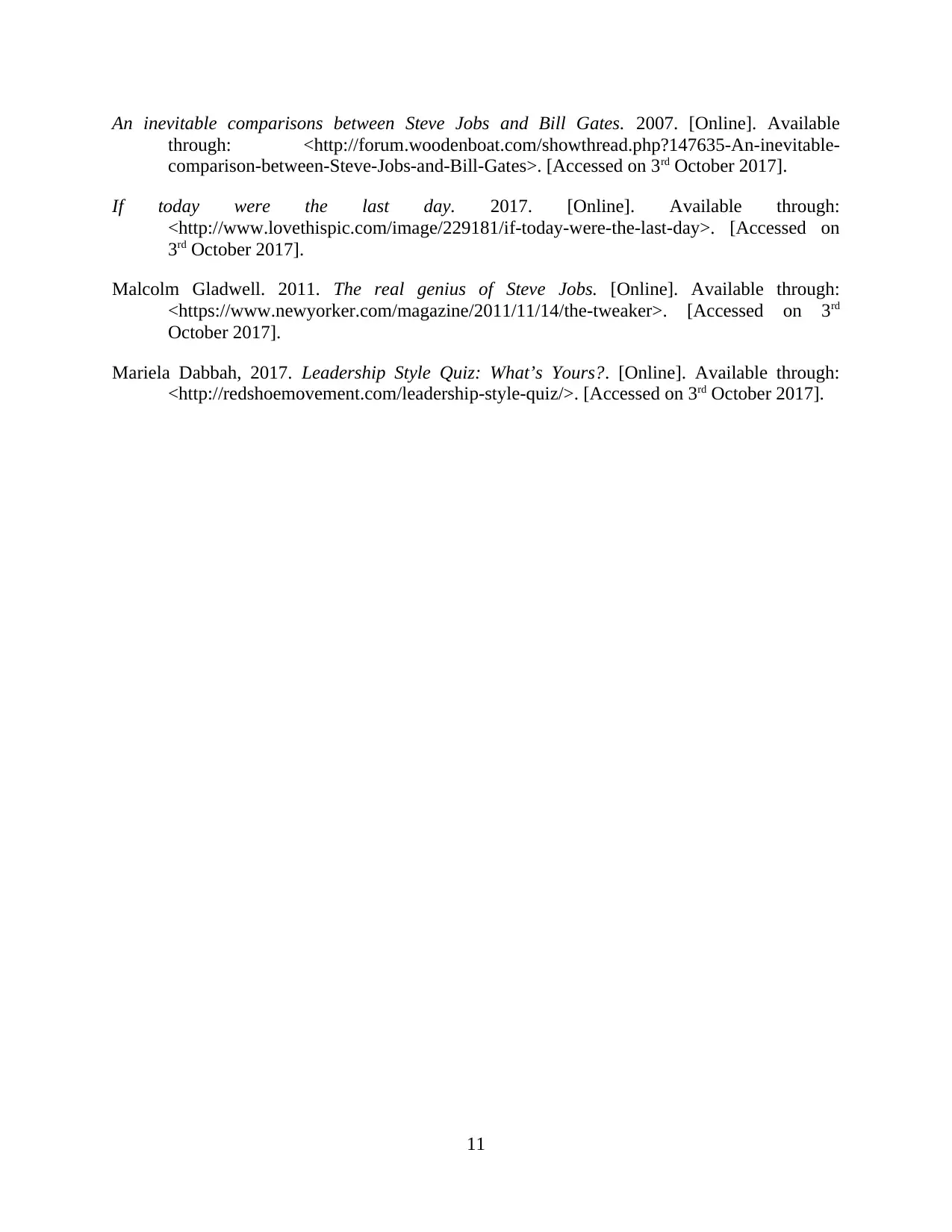
An inevitable comparisons between Steve Jobs and Bill Gates. 2007. [Online]. Available
through: <http://forum.woodenboat.com/showthread.php?147635-An-inevitable-
comparison-between-Steve-Jobs-and-Bill-Gates>. [Accessed on 3rd October 2017].
If today were the last day. 2017. [Online]. Available through:
<http://www.lovethispic.com/image/229181/if-today-were-the-last-day>. [Accessed on
3rd October 2017].
Malcolm Gladwell. 2011. The real genius of Steve Jobs. [Online]. Available through:
<https://www.newyorker.com/magazine/2011/11/14/the-tweaker>. [Accessed on 3rd
October 2017].
Mariela Dabbah, 2017. Leadership Style Quiz: What’s Yours?. [Online]. Available through:
<http://redshoemovement.com/leadership-style-quiz/>. [Accessed on 3rd October 2017].
11
through: <http://forum.woodenboat.com/showthread.php?147635-An-inevitable-
comparison-between-Steve-Jobs-and-Bill-Gates>. [Accessed on 3rd October 2017].
If today were the last day. 2017. [Online]. Available through:
<http://www.lovethispic.com/image/229181/if-today-were-the-last-day>. [Accessed on
3rd October 2017].
Malcolm Gladwell. 2011. The real genius of Steve Jobs. [Online]. Available through:
<https://www.newyorker.com/magazine/2011/11/14/the-tweaker>. [Accessed on 3rd
October 2017].
Mariela Dabbah, 2017. Leadership Style Quiz: What’s Yours?. [Online]. Available through:
<http://redshoemovement.com/leadership-style-quiz/>. [Accessed on 3rd October 2017].
11
1 out of 14
Related Documents
Your All-in-One AI-Powered Toolkit for Academic Success.
+13062052269
info@desklib.com
Available 24*7 on WhatsApp / Email
![[object Object]](/_next/static/media/star-bottom.7253800d.svg)
Unlock your academic potential
© 2024 | Zucol Services PVT LTD | All rights reserved.





